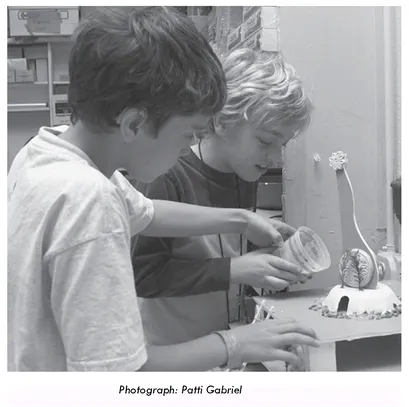
eBook - ePub
Celebrating Every Learner
Activities and Strategies for Creating a Multiple Intelligences Classroom
Thomas R. Hoerr, Sally Boggeman, Christine Wallach
This is a test
Buch teilen
- English
- ePUB (handyfreundlich)
- Über iOS und Android verfügbar
eBook - ePub
Celebrating Every Learner
Activities and Strategies for Creating a Multiple Intelligences Classroom
Thomas R. Hoerr, Sally Boggeman, Christine Wallach
Angaben zum Buch
Buchvorschau
Inhaltsverzeichnis
Quellenangaben
Über dieses Buch
Howard Gardner's groundbreaking theory applied for classroom use
This important book offers a practical guide to understanding how Howard Gardner's theory of Multiple Intelligences (MI) can be used in the classroom. Gardner identified eight different types of intelligence: linguistic, logical, spatial, musical, bodily-kinesthetic, naturalist, interpersonal, and intrapersonal. Celebrating Every Learner describes the characteristics of each type of intelligence and follows up with ready-to-use lesson plans and activities that teachers can use to incorporate MI in their pre-K through 6 classrooms.
- Offers a treasury of easily implemented activities for engaging all students' multiple intelligences, from the New City School, a leading elementary school at the forefront of MI education
- Provides ready-to-use lesson plans that teachers can use to incorporate MI in any elementary classroom
- Includes valuable essays on how and why to integrate MI in the classroom
- Hoerr is the author of a bi-monthly column for Educational Leadership as well as the editor of the "Intelligence Connections" e-newsletter
Häufig gestellte Fragen
Wie kann ich mein Abo kündigen?
Gehe einfach zum Kontobereich in den Einstellungen und klicke auf „Abo kündigen“ – ganz einfach. Nachdem du gekündigt hast, bleibt deine Mitgliedschaft für den verbleibenden Abozeitraum, den du bereits bezahlt hast, aktiv. Mehr Informationen hier.
(Wie) Kann ich Bücher herunterladen?
Derzeit stehen all unsere auf Mobilgeräte reagierenden ePub-Bücher zum Download über die App zur Verfügung. Die meisten unserer PDFs stehen ebenfalls zum Download bereit; wir arbeiten daran, auch die übrigen PDFs zum Download anzubieten, bei denen dies aktuell noch nicht möglich ist. Weitere Informationen hier.
Welcher Unterschied besteht bei den Preisen zwischen den Aboplänen?
Mit beiden Aboplänen erhältst du vollen Zugang zur Bibliothek und allen Funktionen von Perlego. Die einzigen Unterschiede bestehen im Preis und dem Abozeitraum: Mit dem Jahresabo sparst du auf 12 Monate gerechnet im Vergleich zum Monatsabo rund 30 %.
Was ist Perlego?
Wir sind ein Online-Abodienst für Lehrbücher, bei dem du für weniger als den Preis eines einzelnen Buches pro Monat Zugang zu einer ganzen Online-Bibliothek erhältst. Mit über 1 Million Büchern zu über 1.000 verschiedenen Themen haben wir bestimmt alles, was du brauchst! Weitere Informationen hier.
Unterstützt Perlego Text-zu-Sprache?
Achte auf das Symbol zum Vorlesen in deinem nächsten Buch, um zu sehen, ob du es dir auch anhören kannst. Bei diesem Tool wird dir Text laut vorgelesen, wobei der Text beim Vorlesen auch grafisch hervorgehoben wird. Du kannst das Vorlesen jederzeit anhalten, beschleunigen und verlangsamen. Weitere Informationen hier.
Ist Celebrating Every Learner als Online-PDF/ePub verfügbar?
Ja, du hast Zugang zu Celebrating Every Learner von Thomas R. Hoerr, Sally Boggeman, Christine Wallach im PDF- und/oder ePub-Format sowie zu anderen beliebten Büchern aus Education & Education Teaching Methods. Aus unserem Katalog stehen dir über 1 Million Bücher zur Verfügung.
Information
Part 1
The Multiple Intelligences

1
The Interpersonal Intelligence
“But an important variable in leadership seems to be the ability to sense, to be aware of, what is going on in oneself as well as what is happening in the group or organization.”
—JOSEPH LUFT

Web of the Interpersonal Intelligence
Student Quotes
“Having a strong Interpersonal Intelligence is not only about interacting with others, but also thinking for and about others.”
“ I’m Interpersonal because I get along with people. I share my markers with my brother and my games with my sister.”
“ I’m Interpesonal because I like to work in groups and hear someone else’s point of view and what they are thinking.”
“ I love to be around people, and I like to figure things out by talking with others.”
Characteristics
• Enjoys cooperative games, demonstrates empathy toward others, has lots of friends, is admired by peers, displays leadership skills, prefers group problem solving, can mediate conflicts, understand and recognizes stereotypes and prejudices

Famous People
BARACK OBAMA is the forty-fourth president of the United States and the first African American to hold that office.
ELEANOR ROOSEVELT advocated for social reforms that helped the disadvantaged.
OPRAH WINFREY is the host of an internationally syndicated talk show and considered one of the most influential women in the world.
MAHATMA GANDHI was the preeminent political and spiritual leader of India during the Indian independence movement.
Adult Quotes
“ The best way to cheer yourself up is to try to cheer somebody else up.”
—MARK TWAIN
—DANIEL GOLEMAN

The Interpersonal Intelligence
BY LAURIE FALK
In understanding the development of children, there has long been a debate of nature versus nurture. How much comes with a child on the day of birth? How much can we teach? By and large, the answer to the nature/nurture debate is that both matter. This is true for all of the intelligences, including the Interpersonal Intelligence—the ability to understand people and relationships. We, as educators, belong to the set of nurturers in a child’s life, and the school setting offers a prime location for development of the Interpersonal Intelligence—a very important intelligence indeed!
When babies are born, they are by necessity egocentric creatures. Before long, though, they embark on interactions with parents and caregivers that begin their interpersonal journey. Throughout their development, children are constantly learning about themselves and how they are connected to the outside world. This interplay between the developing Intrapersonal and Interpersonal intelligences and relationships with self and with others continues throughout life, but its foundations are set in childhood. We are social animals, and a sense of belonging is critical to our emotional health and well-being. However, the rules, norms, and expectations of social interactions are very complex. Add innate temperament, varied family backgrounds, and cultural diversity to the mix and the task of teaching the Interpersonal Intelligence can seem almost overwhelming. But this need not be the case.
We, as educators, belong to the set of nurturers in a child’s life, and the school setting offers a prime location for development of the Interpersonal Intelligence—a very important intelligence indeed!
There are some important facts about the development of the Interpersonal Intelligence to keep in mind. First, much of this happens organically as human beings constantly interact with each other in many settings throughout life. This development of social learning is obvious with younger children. For example, one expects very young children to learn that verbal expression is more appropriate than physical aggression. One need only to watch a group of four year-olds and their teachers to see this skill being taught and progress being made. This kind of teaching is critical to the development of social skills. The school setting gives the adults a chance to intervene and use those teachable moments when interpersonal interactions are not going according to standards of acceptable behavior. It is imperative that we attend to child-to-child and child-to-adult interactions and use the opportunities that present themselves to teach children appropriate behaviors in real time. However, it is not just young children whose social interactions need to be observed and corrected—the fourth grade student who makes fun of another student needs adult intervention just as much as the four-year-old does. This experiential teaching tool is invaluable; it can seem time-consuming, but it is time well spent. Regardless of a student’s age, we need to intervene when the opportunity presents itself; after all, we are also teaching when we ignore inappropriate behaviors.
It is imperative that we attend to child-to-child and child-to-adult interactions and use the opportunities that present themselves to teach children appropriate behaviors in real time.
In addition to using teachable moments, the development of an Interpersonal Intelligence should also be taught from a planned curriculum. Specific interpersonal lessons are no different than math or linguistic lessons. If something needs to be learned, it must be consciously taught and reinforced. For example, a teamwork lesson would include instruction on the rationale for working together in groups, the specific steps to doing so successfully, and explanations of the interactive process. Then there would be a practice activity on teamwork. But this is not a one-time lesson or practice session. Teachers must give students many opportunities to practice all the skills needed for successful teamwork and acknowledge the students when they are using these skills appropriately. Additionally, they must allocate time for student reflection. If students are to learn from their experiences, it is important that they consciously think about what happened and their role in it.
If something needs to be learned, it must be consciously taught and reinforced. If students are to learn from their experiences, it is important that they consciously think about what happened and their role in it.
Just as in teaching mathematics or history, reflection is best if it is done in different ways. Certainly there are times when a group discussion provides students with the chance to process the lesson together and to engage in a group activity where insights can be shared. At other times, however, individual reflection can take place by writing in journals or by reflecting on a few questions during quiet time allocated for thinking about what the lesson means to them....